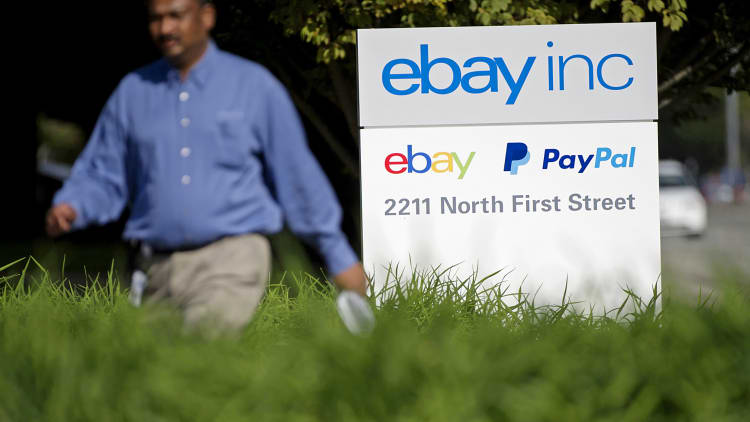The eBay-PayPal split slated for next week is poised to send growth investors in one direction and value investors in the other.
For the riskier set looking to play in the emerging mobile payments market, PayPal will get plenty of attention. The unit, which accounts for close to half of total eBay revenue, grew 19 percent last year and has been beefing up its technology and global offerings by purchasing Braintree and Xoom.
Meanwhile, eBay, which acquired PayPal in 2002, has seen growth in its online marketplace business dip for three straight years to 6.4 percent in 2014. The stock will likely be more appealing to the investor with a greater appetite for dividends and buybacks than wagers on technology's future.
Read MorePayPal buys Xoom
"EBay at an in-between multiple with in-between growth rates didn't find a natural shareholder base," said Gil Luria, an analyst at Wedbush Securities who has a "neutral" rating on the company. "PayPal has the potential to use its balance sheet to grow by acquisition. EBay isn't growing very fast but generates a lot of cash and has the opportunity to return cash to shareholders."
Starting this week, traders can track the companies separately through a so-called when-issued market, as orders begin trickling in for the independent companies. The actual split is scheduled for July 17, and PayPal is expected to start trading on the Nasdaq on July 20, under the ticker symbol PYPL.
EBay stakeholders will receive one PayPal share for every eBay share they own. Based on current pricing in the when-issued market, PayPal will be valued at close to $45 billion and the remaining eBay at about $30 billion.
Chatter about a break-up started in January 2014, when billionaire activist Carl Icahn urged the businesses to go their separate ways and called the move a "no-brainer."
Icahn 's voice grew louder as he snapped up more eBay shares, eventually becoming the second-biggest owner with a 3.8 percent stake.
After publicly rebuffing Icahn for eight months, the San Jose, California-based company bowed to the activist's pressure in September, announcing that, "creating two standalone businesses best positions eBay and PayPal to capitalize on their respective growth opportunities in the rapidly changing global commerce and payments landscape, and is the best path for creating sustainable shareholder value."
Read More Icahn: EBay not for sale
EBay investors can now set their sites on taking advantage of the marketplace's profitability. In 2014, costs in the business accounted for only 19 percent of revenue, compared with 39 percent in payments.
Slow growth and high margins create a recipe for returning cash to investors, who often see that as the best way to reward shareholders. In January, eBay announced a fresh $2 billion stock repurchase program, but the company has never paid a dividend.
Without commenting on its future use of cash, an eBay representative said in a statement that "eBay is a strong business with an excellent balance sheet and our priority is to improve our competitiveness and drive more stable, profitable growth over the long term."

Expanding in e-commerce means contending with Amazon.com, which is growing more than three times faster than eBay's marketplace and with almost no concern for profit. Additionally, there's the looming concern of China's Alibaba, which is seeping into the U.S.
Unsaddled from those risks, investors are betting PayPal can step on the gas. The company owns Braintree, which is battling with Stripe for online and mobile merchant integrations, and peer-to-peer payment provider Venmo. PayPal also just acquired digital money transfer provider Xoom for $890 million.
"We believe PYPL's fundamentals are strong and potentially accelerating," Sterne Agee CRT analyst Robert Coolbrith wrote in a June 30 report. Coolbrith is estimating PayPal's multiple to be twice eBay's, in part because of "new management's commitment to remain relevant to consumers/merchants via a tech-agnostic and full-stack processing approach," he wrote.
Read MoreBest Buy now accepting Apple Pay online
Of course, the online payments universe has never been more crowded. From Apple Pay and soon Android Pay for smartphone users, to Stripe and Adyen for online merchants and Square for point-of-sale systems, EBay faces formidable foes in every corner of its business.
A PayPal spokesman didn't comment for this story but pointed to the company's investor roadshow, where incoming CEO Dan Schulman said "we believe no company is in a better position to lead this coming transformation and deliver the benefits that it offers to consumers, merchants, and investors than PayPal."
Whether that's an accurate prediction of what's to come or just marketing fluff, the stage is set for mid-July.
Investors will then, for the first time since the days of Peter Thiel, Elon Musk and Meg Whitman, get to put their money behind an independent PayPal—or eBay.



